You’re launching a startup.
You’re hustling to get clients, build a product, and keep the lights on.
But your email is still [email protected].
That’s not just unprofessional—it’s a trust killer.
Clients won’t take you seriously.
You need email hosting that screams “I’m legit” without draining your bank account.
You’re probably wondering:
Which provider is reliable?
Which one won’t nickel-and-dime me?
Which one scales as my team grows?
I’ve got you.
This post breaks down the 9 best email hosting providers for startups in 2025.
We’ll cover pricing, features, and what makes each one a fit for your hustle.
Plus, I’ll share stories from founders who’ve been in your shoes.
Why Truehost.com Is Your Startup’s Email Hosting MVP
Before we get into the list, let’s talk about Truehost.com.
Picture this: You’re a founder with a killer idea, but cash is tight.
You need email hosting that’s dirt cheap, reliable, and doesn’t skimp on features.
That’s where Truehost.com shines.
Their email hosting (check it out at https://truehost.com/email-hosting/) starts at prices that won’t make you flinch.
Think professional emails on your domain, unlimited mailboxes, and spam protection—all without breaking the bank.
I know a founder, Sarah, who runs a small e-commerce store.
She switched to Truehost because their plans were half the price of big names like Google Workspace.
Now she’s got custom emails for her team and more cash to spend on ads.
Truehost ties into this post because it’s the underdog that delivers.
It’s proof you don’t need to overpay for quality.
Let’s see how it stacks up against the rest.
Why Email Hosting Matters for Startups
Your email is your brand’s handshake.
A Gmail or Yahoo address screams “amateur.”
Custom domain emails (email@domainname.com) build trust.
They show you’re serious.
Plus, email hosting gives you control, security, and tools to keep your team on track.
Here’s why startups can’t skip it:
- Professionalism: Clients trust businesses with branded emails.
- Security: Hosting providers offer spam filters and encryption to protect your data.
- Scalability: Add mailboxes as your team grows without a headache.
- Collaboration: Many providers bundle calendars, file sharing, and team tools.
Let’s jump into the top 9 providers.
Each one’s been vetted for startups based on cost, features, and ease of use.
1. Truehost.com – Cheapest Email Hosting for Startups
Why it’s great?
Truehost is the budget king.
It’s perfect for startups that need professional emails without the hefty price tag.
Sarah, the e-commerce founder, saved 60% compared to her old provider.
Pricing: Starts at $0.4/month per mailbox.
Features:
- Unlimited email accounts.
- Spam and virus protection.
- Webmail and mobile access.
- 99.9% uptime guarantee.
Best for: Bootstrapped startups with tight budgets.
Downside: Fewer collaboration tools compared to Google or Microsoft.
If you’re just starting and cash is king, Truehost is your go-to.
Check them out at https://truehost.com/email-hosting/.
2. Zoho Mail – Free Plan for Tiny Teams
Zoho Mail has a free plan for up to 5 users.
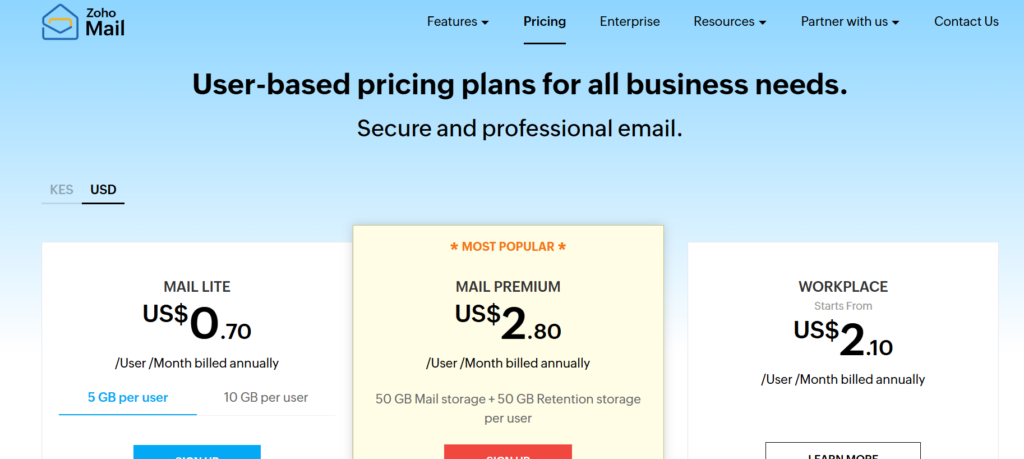
It’s a startup’s dream if you’re testing the waters.
I talked to Jake, a freelance designer turned founder, who used Zoho’s free plan to look legit while pitching clients.
Pricing: Free for 5 users (5GB storage). Paid plans start at $0.70/user/month.
Features:
- Custom domain emails.
- 5GB-10GB storage per user.
- Built-in calendar and task management.
- Integrates with Zoho’s CRM and productivity apps.
Best for: Startups with 1-5 team members.
Downside: Free plan limits storage and features.
Zoho’s a steal for small teams, but upgrade as you grow.
3. Neo
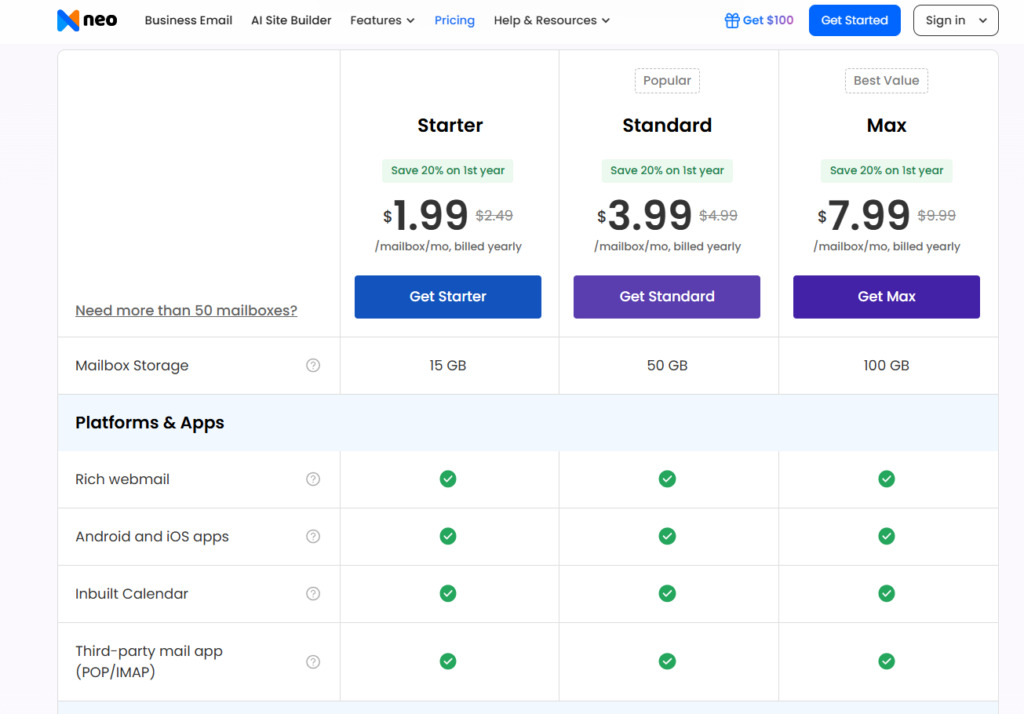
Neo is a one-stop solution for small businesses and freelancers looking to build their online presence.
What does a small business that is just starting with its digital journey want?
- A custom domain name
- An email address with the custom domain name
- A website.
You can get all three on one platform with Neo.
Pricing: $1.99/month/mailbox for Starter, $3.99/month/mailbox for Standard, $7.99/month/mailbox for Max
Features:
- Free domain name registration and website with all plans
- 100% deliverability with zero data loss and full encryption.
- Upto 100 GB storage with every mailbox
- AI-powered features, like AI website builder, AI writing assistant (Smart Write)
Best for: Small businesses, solopreneurs, freelancers
Downside: Advanced and AI-powered features are available in higher-tier plans.
Neo is a solid pick for teams who want a polished business identity, email management, and marketing features without overspending.
4. Microsoft 365 – Enterprise-Grade for Growing Startups
Microsoft 365 is a beast for startups eyeing growth.
It’s got Outlook, Teams, and Office apps in one package.

A founder friend, Mike, swears by it for his 20-person agency.
Pricing: Starts at $7.20/user/month.
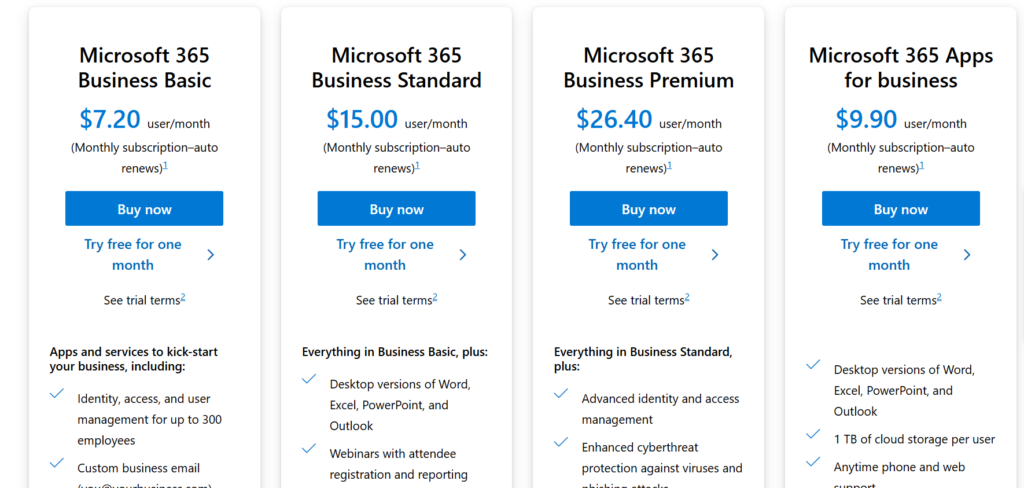
Features:
- 50GB mailbox storage.
- 1TB OneDrive storage per user.
- Outlook, Word, Excel, and Teams.
- AI-powered email tools (Copilot add-on).
Best for: Startups planning to scale fast.
Downside: Overkill for solo founders.
Microsoft’s a heavy hitter for teams ready to go big.
5. DreamHost – Unlimited Emails on a Budget
DreamHost bundles email with web hosting.
It’s a one-stop shop for startups building a website.
A blogger I know used DreamHost to set up emails and a site for under $15/month.
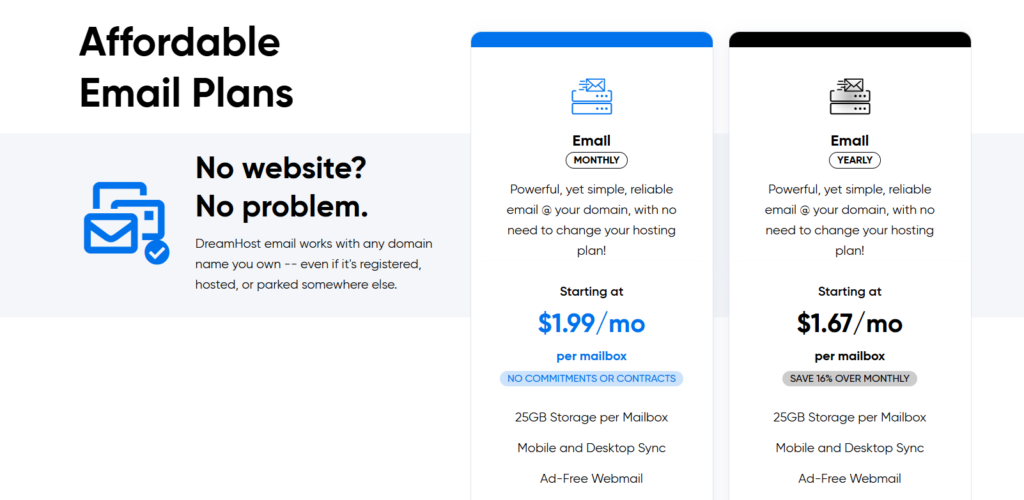
Pricing: $1.67/mailbox/month or $12.99/month with Shared Unlimited hosting.
Features:
- Unlimited email accounts.
- 25GB storage per mailbox.
- Ad-free webmail.
- 24/7 live chat support.
Best for: Startups needing email + web hosting.
Downside: Limited collaboration tools.
DreamHost is a solid pick if you’re launching a site too.
6. Hostinger – Dirt-Cheap with Big Storage

Hostinger’s business email is stupidly affordable.
It’s got enough storage to handle heavy email traffic.
A small bakery owner I met uses Hostinger to manage customer orders via email.
Pricing: $0.59/month for 10GB storage.

Features:
- 10GB mailbox storage.
- Spam filters and antivirus.
- Supports Outlook, Thunderbird, and Apple Mail.
- Free domain with annual plans.
Best for: Startups wanting cheap, no-frills email.
Downside: Limited advanced features.
Hostinger’s a bargain for basic email needs.
Read also: 9 Best Free Corporate Email Hosting Providers (Compared)
7. Bluehost – WordPress-Friendly Email Hosting

Bluehost pairs email with WordPress hosting.
It’s a favorite for startups running blogs or e-commerce sites.
A fitness coach I know uses Bluehost for her branded emails and website.
Pricing: Starts at $2.69/month (includes web hosting).

Features:
- Unlimited email accounts.
- 5GB storage per mailbox.
- Free domain for the first year.
- Spam protection and webmail.
Best for: Startups with WordPress sites.
Downside: Storage is on the low side.
Bluehost’s a no-brainer for WordPress fans.
8. Proton Mail – Security-First for Paranoid Founders

Proton Mail is Fort Knox for your emails.
It’s got end-to-end encryption for max privacy.
A fintech startup I know uses it to protect sensitive client data.
Pricing: Free plan (1GB storage). Paid plans start at $6.99/user/month.
Features:
- End-to-end encryption.
- Self-destructing emails.
- 1GB-15GB storage.
- Mobile apps and webmail.
Best for: Startups in finance or health.
Downside: Pricey for premium plans.
If security’s your top concern, Proton’s your pick.
Read also: 9 Best Business Email Hosting Providers in India (Compared)
9. IceWarp – All-in-One for Collaboration
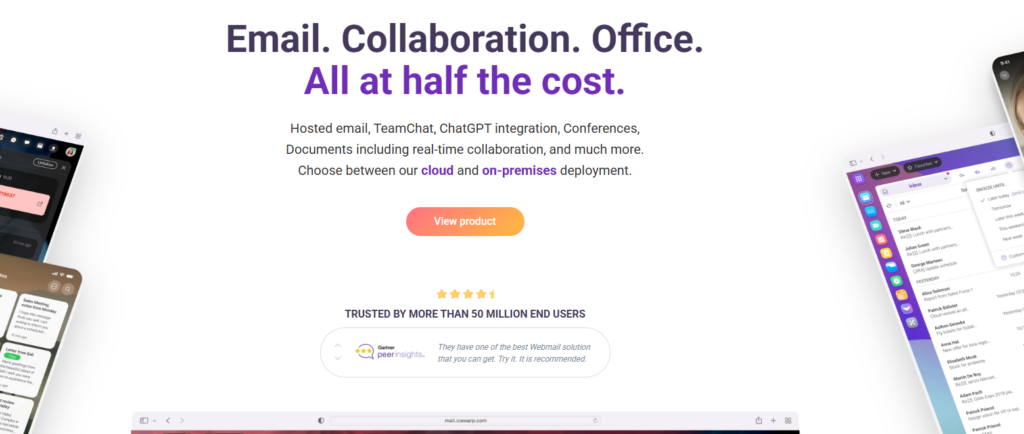
IceWarp blends email with team collaboration tools.
It’s like Google Workspace but with a startup-friendly price.
A marketing agency I know uses IceWarp for email and video calls.
Pricing: Starts at €3.50/month/user.
Features:
- 200GB email storage + 1TB file storage.
- Shared calendars and contacts.
- Web meetings and ChatGPT integration.
- Mobile sync for iOS/Android.
Best for: Startups needing email + team tools.
Downside: Setup can be tricky.
IceWarp’s a hidden gem for collaborative teams.
10. Google Workspace (Bes for Collaborations)
Google Workspace is Gmail on steroids.
It is built for teams who live in Google Docs and Meet.
A tech startup I know uses it to sync emails, docs, and meetings seamlessly.
Pricing: Starts at $6/user/month.
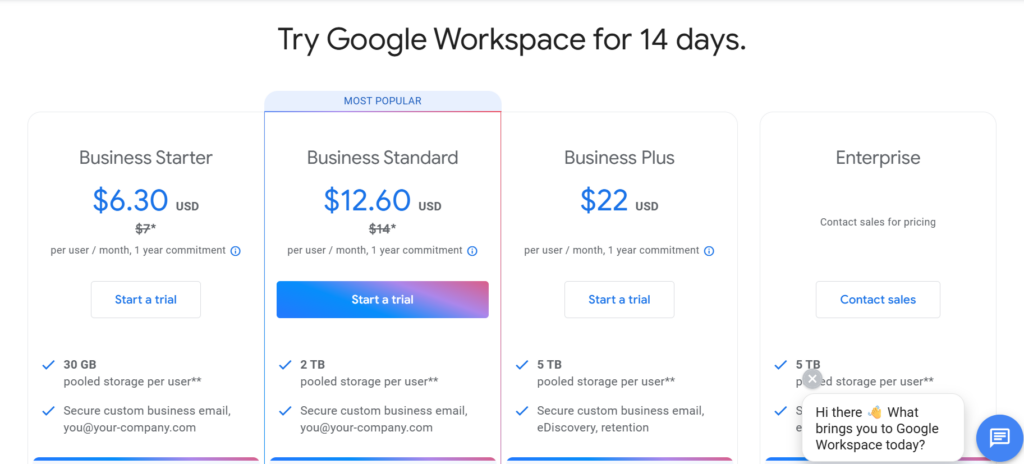
Features:
- 30GB-5TB pooled storage.
- Google Docs, Sheets, and Meet integration.
- Advanced security (2FA, encryption).
- 24/7 support.
Best for: Startups already using Google tools.
Downside: Pricey for larger teams.
If collaboration is your jam, Google’s worth the splurge.
Read also: 9 Best Corporate Email Hosting Providers (Compared)
How to Choose the Right Email Hosting Provider
Picking the right provider feels like choosing a cofounder. You need someone reliable, affordable, and ready to grow with you. Here’s how to nail the decision:
- Set a budget: Startups can’t bleed cash. Stick to providers under $2/user/month if you’re bootstrapping (like Truehost or Zoho).
- Check storage: 5GB per mailbox is fine for most, but heavy email users need 10GB+.
- Prioritize security: Look for spam filters, encryption, and 2FA to keep hackers out.
- Consider collaboration: Need calendars or file sharing? Go for Google, Microsoft, or IceWarp.
- Test support: 24/7 chat or phone support is a lifesaver when emails go down.
- Plan for growth: Pick a provider that lets you add users easily (DreamHost, SiteGround).
Pro tip: Start with a free trial if available (Zoho, Google, Microsoft). Test the interface and support before committing.
Common Mistakes Startups Make with Email Hosting
I’ve seen founders screw this up. Don’t be them.
Here are traps to avoid:
- Using free Gmail/Yahoo: It’s cheap but screams “I’m not serious.”
- Skimping on security: No encryption? Hackers will feast on your data.
- Ignoring scalability: Pick a provider that grows with you, not one you’ll outgrow in a year.
- Overpaying for features: Don’t shell out for Microsoft 365 if you just need basic email.
- Skipping backups: Ensure your provider has auto-backups to avoid losing emails.
A friend’s startup lost a week’s worth of emails because they cheaped out on a no-name provider. Don’t let that be you.
Final Thoughts
Your startup’s email is your brand’s voice.
Don’t let a janky Gmail address tank your credibility.
The 9 best email hosting providers for startups in 2025 give you options for every budget and need.
If you’re bootstrapping, Truehost.com is your best bet for cheap, reliable hosting.
Need collaboration? Google Workspace or Microsoft 365 have you covered.
Want security? Proton Mail’s your guy.
Pick one, set it up, and get back to building your empire.
Which provider are you leaning toward?
Drop a comment or hit me up—I’m curious.
Read also: